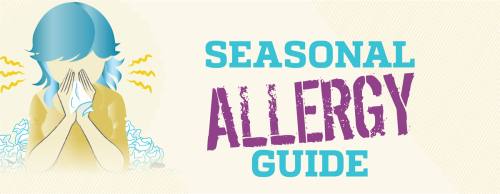 Central Texas is filled with year-round seasonal allergens spawned from blooming trees, grass and weeds. In January pollen from mountain cedar trees is especially severe, with oak, elm and ragweed allergen counts developing in other months.
Central Texas is filled with year-round seasonal allergens spawned from blooming trees, grass and weeds. In January pollen from mountain cedar trees is especially severe, with oak, elm and ragweed allergen counts developing in other months.Allergy treatments
Local allergists recommend a variety of treatments that can help prevent or relieve most seasonal allergies and their symptoms.
Antihistamines
The human body reacts to pollen by releasing histamines, which cause congestion, itchy eyes and other symptoms. Antihistamines such as Allegra and Claritin or the nasal spray Dymista counter the body’s reactions and are available without a prescription.
Nasal steroids
Patients opting for this treatment must begin using nasal steroids before an allergy season and use them daily during the season, along with other medications such as antihistamines.
Flonase: A prescription corticosteroid with an anti-inflammatory agent.
Nasacort: In April this nasal spray became available without a prescription.
Immunotherapy
Doctors can treat sufferers with injections or tongue tablets that contain weakened allergen doses. The treatment allows the body to slowly become more tolerant or immune to the presence of allergens. These treatments are prescription-only and are administered by a doctor. Patients may respond to these treatments with allergic reactions, requiring treatment with an epinephrine autoinjector to prevent shock.
Injections: Patients with 3–5 years of this treatment may have fewer allergies for years.
Oralair and Grastek: In April the Food and Drug Administration approved these under-the-tongue tablets that are designed to treat specific forms of seasonal allergies.
Alternative medicine
Practitioners of Eastern medicine believe allergies are caused by imbalances in the body’s life energy, or chi. A nontraditional provider customizes treatment for an individual.
Acupuncture is intended to stimulate the body’s energy flow, especially in organs such as the lungs or spleen before allergy season or in the nose and face during an allergic attack. Different herbs are recommended based on a person’s lifestyle and specific allergy symptoms.
Symptom relief
Nonprescription decongestants such as Sudafed and Mucinex address allergy symptoms such as nasal congestion. Eye drops such as Alaway and Zaditor relieve itchy eyes.
Do allergies cause...
Headaches? Most headaches are migraines or sinus-related, not due to effects of allergies.
Nasal inflammation? This may result from colds or non-allergic rhinitis, a disease that causes allergy-like symptoms; overuse of nasal sprays; or reactions to odors, smoke, dust, dirt and other non-allergens.
Fatigue? Sleep deprivation or even sleep apnea, not allergies, causes tiredness.
Other allergy myths
Can local honey help immunity?
No. Honey comes from pollen that bees collect from flowers; most allergens come from trees.
Can I boost my immune system with herbs or supplements?
Allergies result from overactive immune systems, so the solution is instead to calm the system.
Should young children avoid plants with allergens?
Physicians once recommended children avoid potential allergen sources, but now believe that early exposure can help children grow accustomed to allergens.
Sources: Dr. William C. Howland III, M.D., Allergy and Asthma Center of Austin; Katherine Webster, LAc, MAcOM, Texas Center for Acupuncture & Herbal Medicine




